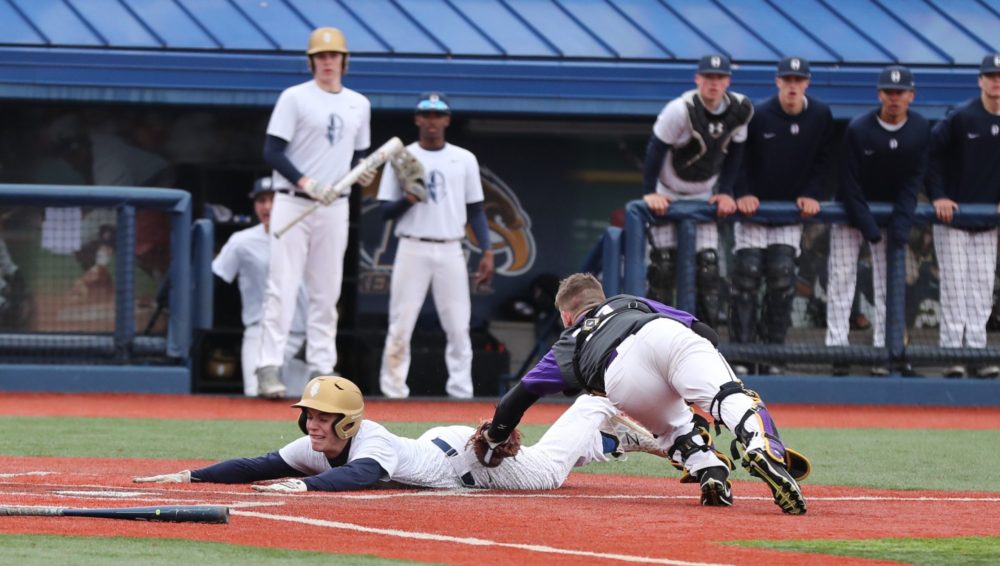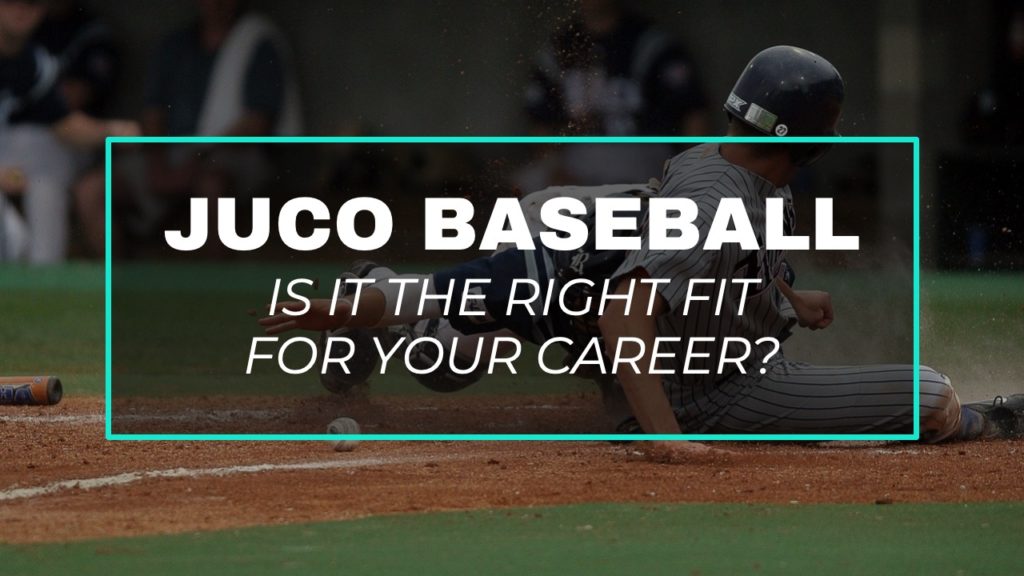*This article may contain product links which pay me a small commission if you make a purchase. Learn more.
Everyone wants to play Division-1 baseball and they thus tend to steer their recruiting efforts to this goal. But there are LOTS of levels of college baseball, and most players will not go D-I.
So, what is JUCO baseball (also known by its formal names of Junior College baseball and NJCAA baseball) and why should you care?
If you’re looking to help yourself or your son get more of out of his career, be sure to check out my new book, Clean Your Cleats.

In this article we’ll cover common questions about Junior College baseball and talk about the level of play, why it’s right for some players and not others, and who should consider it in their college baseball recruiting plan.
First – a Deep Dive into College Baseball Recruiting
How much should you spend on recruiting? When is the money worth it or not worth it? What level will be right for your son?
In this replay of a livestream from my YouTube channel, I explain everything about getting recruited for baseball, with a great Q&A at the end.
For JUCO-Specific Recruiting Advice, Watch the Video Below
Check out my youtube video as well if you’d prefer to listen rather than read.
Jump anywhere in this article using the table of contents below.
Okay let’s jump into it with some quick questions:
Quick JUCO / NJCAA Baseball FAQ
What does JUCO stand for?
JUCO stands for Junior College, and Junior Colleges play in the NJCAA. The term JUCO is sort of slang, and is applied to two-year schools that give students and student-athletes a chance to grow academically and athletically before either earning an associates degree or learning a trade, or transferring to a 4-year school.
What is JUCO baseball?
JUCO baseball is Junior College baseball, and member schools play in the NJCAA – an organization that governs Junior Colleges. Playing NJCAA baseball gives players a good chance to get playing time, develop, grow, and improve their academics before transferring to a four-year baseball program to complete their four years of eligibility. Many JUCO players go on to NAIA, D3, D2 and D1 schools of all calibers, often times schools they were not recruited at during high school. There are private and public Junior Colleges and thought tuition is generally very cheap compared to 4-year universities, it can vary widely.
What are the best NJCAA baseball programs?
In 2020, McLennan (TX), Iowa Western (IA), Wabash Valley (IL), Central Arizona (AZ), Chipola (FL) and San Jacinto (TX) rounded out the top-6 JUCO baseball programs in the country according to Perfect Game rankings. These are very strong NJCAA baseball teams that send players on to professional baseball regularly through the MLB draft.
Why do players go to Junior College for baseball?
Four main reasons: First, to get more time to develop, get bigger, faster, stronger and more skilled before hopefully transferring to a strong 4-year school. Many players with D-1 aspirations choose JUCO first, to try to get better. The second reason is to save money – Junior colleges are much cheaper per credit-hour and the cost savings over a four-year school (even with a scholarship) can be tremendous. It often makes a lot of financial sense. Third, it gives players a chance to improve their academics if their high schools grades and standardized test scores weren’t very good. Four-year academic standards are higher than those of junior colleges. Fourth, some players who are a bit immature or not quite ready for a big campus get a chance to stay closer to home (in the case of choosing a local community college) and start their college experience at a smaller school with small class sizes.
Why Should Ballplayers with D-1 Aspirations Consider JUCO Baseball?
It’s great to have dreams of playing at the highest possible level. Though it’s a fantastic experience to play any level of collegiate baseball, many players want the clout, competition and shiny facilities, gear and travel that D-1 baseball has to offer.
Check out this gorgeous photo from the University of Maryland Baseball twitter account…THAT is why players aspire to play D-1 baseball.
#BaseballSky 😍 pic.twitter.com/kIs2iH7qOq
— Maryland Baseball (@TerpsBaseball) November 12, 2020
But, if you’re not at that level–and have not been recruited by any D-1 baseball schools out of high school, what should you do?
If you’re still deep in your recruiting process, be sure to check out my recruiting videos on my YouTube channel.
Make sure to spread yourself around with a good recruiting video and email college coaches.
Should you go JUCO?
Let’s start with four reasons it makes sense to go play NJCAA baseball.
Reason 1: JUCO Baseball is Great For Players Who Need More Time to Develop.
Coach Andrew Sacks who works with tons of baseball players in the Baltimore area and is a former collegiate catcher, sums it up quite well in this tweet:
High schoolers: if there’s a missing piece of your game/development (velo/speed/power/etc) keeping you from playing at the collegiate level you want, consider JUCO. Knock out gen-eds for less money, develop your weak points, and doors will open for you after your time there.
— Andrew Sacks, CSCS (@Andrew_Sacks) January 9, 2021
His point spot-on: if you’re just not quite there yet, two years at a JUCO baseball program can do a lot of good. Being on a great strength training program is a huge bonus.
I asked Coach Sacks for a little more details, and he had this to say:
Personally, I think that JUCO is a tremendous opportunity for high school baseball players who aren’t being heavily recruited by the kinds of schools they want to attend/play for.
The landscape of college baseball is changing, and it seems like more and more really good players are taking advantage of the “JUCO route” to further their athletic careers rather than accept a “preferred walk-on” spot and ride the bench behind scholarship players, waiting for their turn to crack the lineup.
– Coach andrew Sacks, Prime Sports Performance
Strength and arm care routines are crucial, and unfortunately they don’t give results overnight, so JUCO can be a good route for slow bloomers.
Reason 2: Junior College & Community Colleges are Much Cheaper
It’s expensive to go to college, and to be quite honest, the system is broken – the return on investment spending $30,000-$60,000 per year at 4-year colleges is the lowest it’s ever been. Don’t believe me?
This NYU professor, Scott Galloway, is outspoken about how badly the university system in the US needs reform.
I’d encourage you to watch his short video below.
Playing NJCAA baseball can make a lot of sense when your family doesn’t have a ton of money to pay for an expensive four-year school and scholarships may not foot the bill.
Reason 3: You Can Fix or Improve Your Academics at a Junior College
It’s not just about baseball – as a college student-athlete, academics are extremely important.
For some players with poor grades or test scores in high school, the question of should you go JUCO? is an easy one: YES.

Lots of young athletes (myself included) aren’t big fans of school. And if you don’t put forth enough effort in high school, a lot of doors can end up closed because of the academic standards 4-year schools require for eligibility.
So if perhaps you didn’t put forth a great effort in high school but are now ready to turn it around–or you just don’t have any other options–playing college baseball at a two-year school can be a great choice.
Reason 4: You’re Not Ready Yet to Go Off to a Big School
Let’s face it: many 18-year-olds just aren’t that mature, and the idea of them running off to a big school in another state just sets them up for failure. This does NOT mean these student-athletes are failures, but rather that a stepping-stone environment like an NJCAA baseball program might be a better fit.
The Reality of Big Four-Year Schools

Say you get a chance to play big-time baseball at State University. Wonderful! Congrats! What will the experience be like?
- Big, expansive campus with 30,000 students
- Huge classes with little interaction with teachers
- Strict baseball schedule that must be managed tightly with academics
- Lots of freedom (can be a good or bad thing)
- Potentially a long way from home
- Pressure to perform well on the field to keep one’s scholarship and playing time
This can be too much for many young men who are still–more than they’d like to admit–kids.
Remember: it’s not JUST about athletics. The academic and life balance matters SO MUCH.

Every semester in every school in every sport there are new student-athletes who struggle adapting to life at college and fail at it.
- They get bad grades
- They mismanage their time.
- They struggle on the field
- The struggle with relationships.
- They struggle mentally.
It can be a big change that overwhelms a percentage of students-athletes.
Sometimes parents need to make an informed choice on whether their kids are ready for this huge jump in freedom and independence. Many are, but some are better going the JUCO route in baseball to adapt a little more slowly.
Is JUCO Baseball Good? How’s the Competition Level?
It varies quite a lot–from outstanding teams who could beat many D1s and have players drafted regularly…
…to downright terrible teams that would get beaten by strong high school programs.
It really just depends. Watch a few clips of the NJCAA World Series below and get a glimpse into the highest level of junior college talent.
But keep in mind – the players above are the best of the best in the whole country, so don’t get demoralized if you don’t think you could hang against either of these teams…
What Factors Go into Whether a JUCO Program is Good?
There are some phenomenal NJCAA baseball programs out there.
Resources, lineage, name recognition and location are major factors in a program’s quality in ALL levels of college sports.
- Budgets vary widely – Many great coaches don’t do it for the money, but low-paying coaching jobs also don’t attract the best talent.
- Facilities vary widely – Teams can win on any field, but having a poor-quality field doesn’t attract high-quality players.
- Winning matters – The best players often (not always) choose programs that already win consistently.
- Location – There are JUCOS in big cities, but many are in very remote, small towns. Small towns typically don’t attract amazing talent.
Are there exceptions to all of these rules? Absolutely.
There are many outstanding programs that compete at an extremely high level, send players off to the pros and boast amazing facilities and coaching staffs. The JUCO World Series is a big deal and draws huge crowds in Grand Junction, Colorado.
How it started … How it’s going pic.twitter.com/CuaGQIg279
— JUCO World Series (@JUCOWorldSeries) October 9, 2020
Remember: There is a Wide Range of NJCAA Baseball Program Quality
Most NJCAA baseball teams, which are often from public community colleges, don’t have huge budgets for the facilities, great coaching staffs and resources found at much bigger universities.
In general, schools with a combination of low budgets, poor facilities, a losing heritage and a remote location don’t attract consistently great baseball players.
Like all programs, as financial resources flow in and facilities are upgraded, new players are attracted by the idea of playing on a nice field and working out in a nice, new weight room – then, the team starts to win more and the snowball effect continues.
Do Your Homework if You’re Considering a JUCO Baseball Experience
One thing to know is that you absolutely need to do your homework because the level of play in JUCO is much more varied than at the D2 or D1 level, where schools have vast resources to spend and significant facilities, scholarship pools, recruiting clout, etc.
Email college coaches at all levels and see if or what they reply. This video below shows you how.
Casting a wide net is a good thing!
Matching Your College Baseball Recruiting Plan to Your Ability
Is D1 going to be realistic? Is D2? D3? Junior College? How good are you? Do you have a college baseball recruiting plan?
Before you proclaim your kid is destined to “go D1” you should probably go checkout your local JUCO squad and see if your kid can even play there … There are JUCOs (and D2s, D3s, NAIAs) that’ll legit embarrass some D1s. That’s not even close to an exaggeration either.
— Nick Buonocore (@Nick_Buonocore) January 8, 2021
I like this quote from Nick Buonocore on Twitter. His point is 100% correct – many parents and players don’t have a good familiarity with the level of play even on their most local collegiate teams.
Ask yourself: could you play at the JUCO down the street?
Never mind the handful of D1s – start there and be honest with yourself. Go to some games and see what the talent level looks like.
If you’re a pitcher and need to keep improving, grab a copy of my book below.

Do Junior College Baseball Players Transfer to Good Schools?
Well, let’s start with a success story below. I don’t know this player and have no ties to the University of Kentucky, but this certainly seems like a JUCO success story. UK Baseball plays in the SEC, one of the premier D1 baseball conferences in the country.
Transfer @jakeplas02 has flashed big potential at his previous stops.
— Kentucky Baseball (@UKBaseball) January 4, 2021
He batted .339 with a .952 OPS in JUCO last season after earning summer league all-star honors in 2019 (.313, 16 XBH, 9 SB in 96 AB). The Padres drafted him out of the Chicago-area prep ranks in 2018. pic.twitter.com/cT9uwfhV2T
One of my proud moments as a coach was watching the young man below, Clifton Slagel, transfer to Tulane University from Heartland Community College in Illinois. Heartland is a very strong JUCO baseball program, and he pitched extremely well there in his two seasons.
Big night for @GreenWaveBSB. How special was that performance by @BradenOlthoff @cliftonslagel @keagangillies10 @hhastings19 #Wow #NoHitter #MMFD pic.twitter.com/u7646ZBZsO
— Daniel Latham (@DanielLatham19) February 29, 2020
His velocity improved over those two season in JUCO from 86-88 to 88-92, and his ability to pitch and spin his breaking stuff improved immensely as well. He developed a lot.
Then, he earned his chance to transfer to an amazing D1 program at Tulane, and was part of a combined no-hitter in his first season there in 2020.
Check out this article on impact JUCO pitchers transferring to D1 from D1baseball.com. It talks about many transfer pitchers who will jump right in to making waves in a starting rotation or bullpen.
Is Choosing NJCAA Baseball Risky For One’s Career?
I think the main risk players are concerned about is not getting a chance to play big-time baseball for a name brand school and ultimately getting a chance to play professionally.
One thing to remember: when you go JUCO, you have to go through the recruiting process a second time after your two years are complete. This is not ideal – recruiting a stressful part of being a young ballplayer.
Some NJCAA coaches do a phenomenal job helping players transfer to four-year schools.
Others, however, do NOT – and this is where the risk comes in:
What if you turn down a small four-year school, then have two good years at JUCO but no four-year school makes an offer? Unfortunately, this does happen for some players.
A College Coach Weighs In: Who Is The NJCAA / JUCO Route Right For?
Lets conclude with a quote from Morgan Depew, the recruiting coordinator at St. John’s River State College in Florida.
I asked Coach Depew: What types of players benefit from going the NJCAA route?

One type is players who struggle academically or financially. Academically, it’s less restricted for initial eligibility. Financially, junior colleges offer scholarships that can cover tuition, housing, and meals on top of the already discounted tuition.
The second type of player is the later developing athlete. A player whose skills after 2 more years more of development and playing will earn him a larger role at a 4 year school.
– Coach Depew
Is the Junior College baseball route right for You?
It might be, or it might not. Do you research and consider all the different possibilities that are open to you.
Hopefully this article shined a little more light on the subject and different factors to consider.
Important Baseball Resources For Aspiring Players
My books are a great start. If you haven’t already read my pitching book, grab a copy below.

If you’re considering the NJCAA route, then you must still need to improve. I’ve got resources that can help:
- My Online Strength Training Program
- This Detailed Pitching Mechanics Article
- How to Throw a Great Changeup
- Baseball Positions: Guide to Body Type, Skills and More
- My Pitching Books
- My Online Baseball Pitching and Mental Training Courses
BONUS College Baseball Recruiting Tips
And, check out my video below with college baseball recruiting tips. My YouTube channel is filled with videos like this one for aspiring ballplayers.
